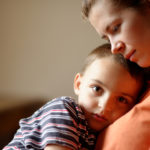There is significant literature indicating that a mother’s depression may adversely affect her young child. Studies have demonstrated that the children of depressed mothers are more likely than the children of non-depressed mothers to exhibit developmental delays and childhood behavioral problems. It has also been demonstrated that the children of depressed mothers are more likely to present with psychiatric illness at a younger age.
What is not so clear is exactly how maternal depression leads to these problems in the child. Some researchers have postulated that oxytocin may be involved in mediating the effects of maternal depression. First of all, what exactly is oxytocin? It is a neuropeptide produced by the hypothalamus and released into the blood via the pituitary gland. Often referred to as the “hormone of love”, oxytocin plays an important role in childbirth, maternal behavior, lactation, social affiliation, and sexual pleasure. Oxytocin activity increases in response to stress, as well as to warm social or physical contact.
Dr. Ruth Feldman and her colleagues at the Bar-Ilan University in Israel followed a group of mothers who were consistently depressed during the first year of their children’s lives and a control group of women who were not depressed. At six years of age, they assessed the children. They discovered that 61% of the children with depressed mothers displayed some sort of psychiatric disorder, mainly anxiety and oppositional defiant disorder, compared to 15% of the children of nondepressed mothers. The children of depressed mothers also demonstrated less social engagement with their mothers, less playfulness and creativity, and lower social involvement than children in the control group.
Since oxytocin is the hormone which mediates social engagement, the researchers wondered if some of these behaviors in the children of depressed mothers might be related to lower oxytocin levels. They found that oxytocin levels were lower in the mothers with depression and in their children.
They also discovered that the depressed mothers and their children were also three times more likely than the children in the control group to have a the GG homozygous genotype variant of the oxytocin receptor (OXTR). Presence of a single OXTR A allele (GA or AA genotype) in depressed mothers markedly decreased the risk of child psychopathology. This finding parallels research studies in older children, which demonstrated that adolescent girls with this oxytocin receptor variant who had exposure to early adverse life events were more likely than girls with the GA or AA OXTR genotype to experience higher levels of depression and anxiety.
Is There a Role for Oxytocin in the Treatment of Maternal Depression?
While these data are preliminary, it raises some interesting questions. For one, what would happen if we gave oxytocin to mothers with postpartum depression? Would it help with the depression or improve bonding and social engagement with the child? Thus far, there have been a handful of studies which have looked at the effects of oxytocin administered to women with postpartum depression. One study found that oxytocin did not make depressed mothers happier but their perception of the relationship with their baby improved. In another study, researchers found that depressed mothers who received intranasal ocytocin became more protective of their children.
And what about the children of depressed mothers? Could children at risk for psychiatric illness be identified early by measuring their oxytocin levels and/or identifying vulnerable variant genotypes of the oxytocin receptor? Would it be possible to reduce risk for psychiatric illness in these children using interventions that increase oxytocin levels, such as promoting physical contact and/or social engagement?
One intervention that may reflect the beneficial effects of oxytocin is infant massage. Dr. Tiffany Field promotes infant massage, a common childcare practice in other parts of the world, including Africa and Asia. Her research has demonstrated that infant massage has many benefits for the child and the mother. Compared to infants who are rocked, massaged infants cry less, are easier to soothe, show fewer signs of being stressed, gain more weight and sleep better. Field also notes improvement in how the mothers interact with their babies. Depressed mothers who perform massage therapy for their infants are more engaged and show more positive interactions with their infants; they also experience a reduction in levels of depression and anxiety.
Ruta Nonacs, MD PhD
Apter-Levy Y, Feldman M, Vakart A, Ebstein RP, Feldman R.
Am J Psychiatry. 2013 Oct;170(10):1161-8.
Mah BL, Van Ijzendoorn MH, Out D, Smith R, Bakermans-Kranenburg MJ.
Child Psychiatry Hum Dev. 2016 Apr 21.
Oxytocin in postnatally depressed mothers: its influence on mood and expressed emotion.
Mah BL, Van Ijzendoorn MH, Smith R, Bakermans-Kranenburg MJ.
Prog Neuropsychopharmacol Biol Psychiatry. 2013 Jan 10;40:267-72.

![By Vera Kratochvil [Public domain], via Wikimedia Commons](https://womensmentalhealth.org/wp-content/uploads/2015/06/Mother_Kissing_Baby.jpg)






Leave A Comment